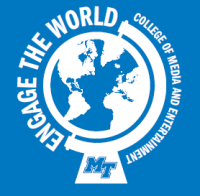Mass Comm alumni Paul Bernardini (’11) and Landin King (’10) both work at San Francisco-based Eastwick, a public relations agency specializing in media relations, social media, measurement and analytics, and more. Keep reading to learn about their experiences in a West Coast PR agency and their advice for budding PR pros.
Tell us about work at Eastwick. Who are your clients and what are your agency’s services? Describe a typical day on the job, if that exists!
Landin: A typical day at the job – type first and breathe later. I am very new in my position, so I am still figuring out what a day’s schedule looks like. I am working in an entirely different industry and therefore have taken a step back to make sure I get a strong grasp of my clients before pushing too hard into communication on their behalf.
My current client load focuses largely on business units of Quest Software, which creates software for enterprises with needs such as application performance monitoring or identity and access management. I also work with companies like ParAccel on the promotion of big-data analytics platforms. Have questions on what these companies do? I had a lot as well. My advice is to read until your eyes won’t read anymore. You will get it eventually.
Paul: We are a tech-focused agency. Our clients range from startups to large, public companies. To name a few: Seagate, Quest/Dell, Violin Memory, Ooyala, July Systems, Bridgelux, D-Rev and many more. As you can imagine, the bulk of our work is media-relations focused. However, we do have a full creative team building a portfolio that entails videography, graphic designs, infographics, messaging, social media, content creation, council and strategy, measurement against competitors, etc. The list of capabilities and value we provide clients is a very long one. I’m afraid my measly list does not do it justice.
A day in the life! I remember wanting to know the answer to that question SO much when I was in the PR program. What can I expect? And is this right for me? In short, a typical day doesn’t exist – there are a lot of moving parts in PR, and it is by no means a typical 9-to-5 gig. In the past couple of weeks alone, I’ve acted as content creator/journalist for a client at an industry conference, traveled to multiple clients’ offices in various cities to meet about upcoming launches, strategy and how to position them against the other guys, pitching and, of course, lots of writing.
What do you think makes a great public relations practitioner?
Landin: To be a good PR practitioner requires a handful of pretty basic skills.
- Write well and be confident.
- Understand your clients and represent them as if you were the face of the company.
- Understand writers and analysts. Don’t waste their time. Ever.
- Present opportunities that are worth being written about.
- Don’t be afraid to tell your client something is not worth being written about.
Paul: A few things: Care about your client as if it’s your own company. Read read read read read and then read some more. With technology, it is an in-depth profession that requires in-depth knowledge. Research the media targets you are pitching. There tends to be this tension between PR and media and, sure, there are a few media folks who curse the life of any PR practitioner. Yet, from my experience so far, media are thankful for the connections we provide and story ideas we bring to them. BUT, and this is a big but, if you don’t do your research and know the journalist’s beat and personally tailor the pitch of your relevant story, I guarantee you will receive a very large and blunt NO. Once the relationships are made, it all becomes much easier.
How did your experiences at MTSU prepare you for your job? What’s your advice for students preparing to enter the workforce?
Landin: My advice for graduates would be to meet as many people as possible. Represent yourself as a professional and you will become one. Don’t get too wrapped up in doing a job so well you lose yourself. Have fun or do something else.
Paul: Honestly, college and the real thing are night and day. Get internships – many of them. Start writing and build your online presence via Twitter, LinkedIn, Tumblr, Facebook, blog, etc. Agencies are looking for this. Clients need social-media assistance, and agencies will want to know what you’re doing in that regard.
Think about an industry you’re interested in and start reading the publications. Get to know the reporters and typical beats. See how the industry is talked about, the trends and the big stories. All of this knowledge shows that you have a finger on the pulse of your respective industry. This will be impressive to any agency you interview with. Start now – sooner is better. All I can say is this: The college experience that mattered most in my interview had to do with internships and classes that afforded the opportunity for real-word experience. TLE
By Aileen Wark Bennett


Leave a Reply